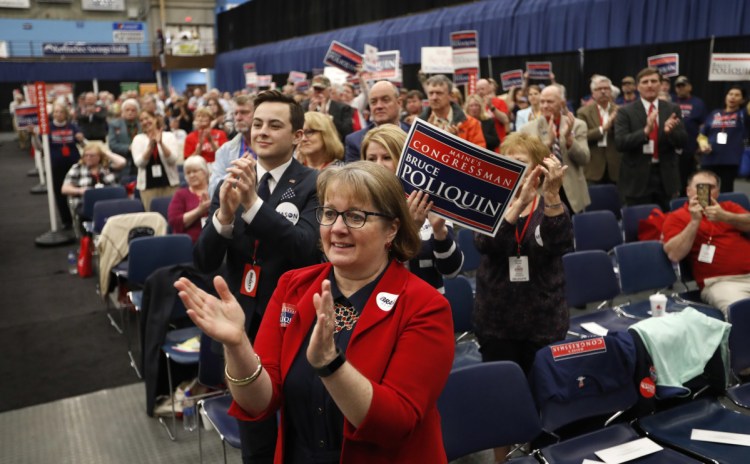There may still be one thing on which Republicans and Democrats can agree: This is a divided nation.
Issues that don’t break down on party lines are as hard to find as a pro-choice Republican, or a Democrat who thinks climate change is a hoax. They’re out there, but you really need to look hard.
The divide even goes beyond politics. According to a study last year by the Pew Research Center, it even shows up when you ask people about real estate. “Most Republicans (65 percent) say they would rather live in a community where houses are larger and farther apart and where schools and shopping are not nearby,” the researchers found. “A majority of Democrats (61 percent) prefer smaller houses within walking distance of schools and shopping.”
The power of partisanship is something to think of as Maine Democrats close up their convention, two weeks after the Republicans held theirs. In a little more than three weeks, voters who belong to a party, or who are willing to join one temporarily, will get to nominate candidates for the November general election. If history is a guide, only about 10 percent of eligible voters will participate in one contest or the other. But one of the winners in June and not an independent will likely be Maine’s next governor.
That’s how it works in 2018: People disdain political parties, but when it’s time to vote, they are as partisan as hell. This is true, even in Maine, where people pride themselves on their independence.
About 40 percent of registered voters are not enrolled in a party and they outnumber both Democrats and Republicans. We have a history of electing independents like Angus King (for both governor and senator) as well as moderate Republicans like Bill Cohen, Olympia Snowe and Susan Collins. But Maine is not so different as we like to believe.
But nationally, 42 percent of voters identify themselves as independents, according to a Gallup poll. But even that doesn’t tell the whole story. They may call themselves independents, but on Election Day, most of them vote for party candidates and they do it as consistently as full-fledged party members.
Look at the Republican presidential results in 2012 and 2016. You couldn’t have had two more different candidates than Donald Trump and Mitt Romney, but the number of votes they got and the places the votes came from are almost identical. This was not a case of people changing their minds. The reason that Trump won in 2016 and Romney lost in 2012 is that more Democrats showed up to vote for Barack Obama than Hillary Clinton.
There are a lot of explanations for our divide. One is that people move around the country and settle where there are other people like them, sort of a self-gerrymander. Republicans flee to their big houses and remote shopping centers, while Democrats rub shoulders in the walkable neighborhoods. It makes it less likely that we will even meet people with different political views.
There is also the way that we get our information. We not only get to choose how we get our news, we can pick what news we want to hear.
Friendly news outlets and social media feeds reinforce what we already believe and sow distrust of people who think otherwise. Anyone who tells us something we don’t like is probably pushing “fake news.”
Partisanship is really easy to see when someone else is engaging in it, but harder to notice when it’s you or one of your friends.
It’s kind of like riding a bike in the wind: When it’s in your face, you feel it, but when you’re cruising with it at your back – what wind?
Remember when Republican members of Congress said they cared about the deficit? It tends to be a big deal only when a Democrat is president.
Or remember when most liberals thought that Mitt Romney was a selfish plutocrat, “Mr. 47-percent,” who told a bunch of fat cats that almost half the country refuses to “take responsibility for their lives” because they don’t earn enough to owe federal income tax? But once he started calling Trump names, he became a man of principle.
I don’t mean to say that there are not real differences between the parties, or that every disagreement is just a mindless reflex.
Society is changing in ways that some people like and others don’t and it’s natural that those kind of disputes will end up in the political arena. There is no “win-win” answer to the question of whether a pregnant woman should have the right to choose an abortion. A little partisanship is necessary to organize the opposing forces and it’s probably healthy.
But polarization is not. You don’t have to like the other side, but once you can’t tolerate its existence, democracy won’t survive.
Greg Kesich is the editorial page editor. He can be contacted at:
Twitter: gregkesich
Send questions/comments to the editors.



